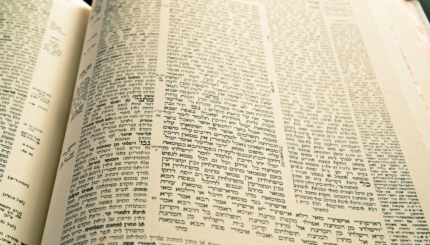Commentary on Parashat Bamidbar, Numbers 1:1-4:20
After my grandfather’s death, I rifled through a shabby valise into which he had tossed important-seeming documents. Among the runic scraps were several fragile pages of typewritten Yiddish with their English translation, signed and dated, Tel Aviv, 1957, and titled “Sworn Declaration in Lieu of Birth Certificate.”
The Declaration’s armature of legalese, embossings, seals and signatures provided no diversion from the sad, bare facts of its purpose. Among the more mundane things that World War II had apparently taken from my grandfather were the various cards and certificates, the official tokens of passage that validate one’s legitimacy as a citizen, resident, person. In lieu of these he had improvised, finding two men to attest to the names of his lost parents and the faraway city and date of his birth. Swearing “by Almighty God,” they concluded:
We know from personal knowledge these facts, having known his parents since before his birth, … all the important events which happened to this family, and were present at the Circumcision ceremony, which according to the Jewish Religion Ritual, took place 8 days after the boy’s birth.
This officious document sounded in my ears as I read Rashi’s commentary on the Israelites gathering for the desert census in Parashat Bamidbar: “They brought the documents of their pedigrees and witnesses of their birth claims, each and every one to declare their pedigrees after their tribes.”
The Anxieties of Belonging
With this, Rashi cracks open the Torah portion’s decorous, formulaic narration of the census. He reveals what must have been a cacophony of men presenting their witnesses, reciting their lineages, and gesticulating, documents in hand, to confirm the facts of their birth — the wonderful, plaintive roar of hundreds of thousands of men shouting into the vast wilderness who they were and affirming that they belonged.
With your help, My Jewish Learning can provide endless opportunities for learning, connection and discovery.
It is not hard to hear the anxieties of identity and belonging straining through the Israelites’ declarations of “pedigrees after their tribes.” At the time of the desert census, the clamoring Israelites could look back a mere two years (Numbers 1:1) to their enslavement in Egypt and peer expectantly into the coming 38 years before they would finally settle in Canaan. During those long years of wandering they surely contemplated that theirs was a history of dislocation, beginning with Abraham and continuing through the migrations of Jacob from hunger and Joseph — whose bones they carried — from violence.
These same anxieties are silently interlineated into my grandfather’s Declaration. The document was executed two years before my grandfather would leave Israel for America, where he would join the one other surviving member of his family; nine years before he would be naturalized as a United States citizen; and 17 years after he had left his parents in the home-town that had closed in around them as a ghetto. He had lived in Uzbekistan, Germany, Tajikistan, Poland, the far-northern and other-reaches-of-Russia; and many towns, cities, trains, refugee camps, work camps, jails, and territories in between.
In their wanderings then, these men–the desert Israelites, my grandfather–were not all that different from the roughly three percent of today’s world population, or one out of every 35 people on the planet, who are compelled to leave their homes because of discrimination, violence, economic necessity or opportunity, war, or hunger.
Migration Today
Today’s global migrants, like my peripatetic forebears, are suspended in the precarious place between a difficult past and a hopeful future–a future that might just hinge on proving their claims to belonging, on providing the proper declarations of pedigree for the proper tribe.
For those undocumented migrants around the globe–who are sometimes precluded from ever attaining legal residency because of their ethnicity or origin–the hopeful future vanishes if they cannot secure the proper papers. This is the stark, unstable reality for the hundreds of thousands of Burmese migrants in Thailand, and Haitians in the Dominican Republic; the millions of Zimbabweans in South Africa; and of course, the many scores of different peoples from around the world in the United States.
Massive migration has been called “one of the defining global issues of the early 21st century.” But the Jewish community has been weaving the legacy of forced and chosen migrations into our shared psyche for several millennia. When we turn to the challenges attendant to today’s migrations–exploitation, isolation, resource distribution–we should thus recognize a likeness in the millions of global migrants who leave home to find better–or simply possible–lives. As two men swore in Tel Aviv, in 1957: “We know from personal knowledge these facts.”
Indeed, this recognition is the animating force of the divine charge to the nation that God repeatedly uprooted: “Do not oppress the stranger, for you know the soul of a stranger; you were strangers in the land of Egypt (Exodus 23:9).” The strangeness of soul that is born of dislocation is an integral part of our existential legacy: The empathy forged from it should be a defining quality of our moral one.
Provided by special arrangement with American Jewish World Service.


